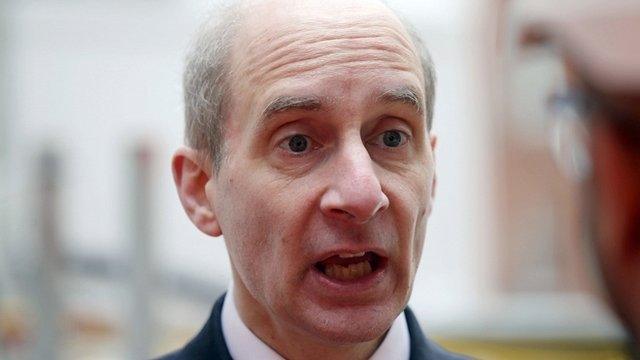Is this the end of the 'fat-cat' university bosses?
- Published

Dame Prof Glynis Breakwell is stepping down from her role as vice-chancellor of the University of Bath - after an intense campaign, including by many of her own staff, complaining about excessive levels of pay.
It might be a fall from grace, but it's also a rather graceful fall - remaining on full pay during a sabbatical that will take her into 2019.
Her chief harrier, the former Education Minister Lord Adonis, says the terms of the departure are "outrageous" and symptomatic of an excessively cosy culture at the top of universities.
He is turning his sights on other institutions, listing Exeter, Southampton and Birmingham as among more than 50 universities paying their bosses more than £300,000 per year.
His charge is that there is insufficient regulation - and that universities need to have proper accountability when so much of their funding comes from the public purse or the pockets of students.
Cheerleaders or regulators?
Lord Adonis is particularly scathing of what he sees as the conflicts of interest in the bodies at the top of higher education, where cheerleaders, lobbyists and regulators can seem interchangeable.
The universities representative body, Universities UK, has nothing to say on this dispute about the Bath vice chancellor's pay, the biggest current story in higher education.
Sitting on its board is Dame Glynis - and Universities UK says there are no plans for that to change.

Lord Adonis says there has been regulatory failure over university leaders' pay
There is a new regulatory body, the Office for Students, with a chief executive, Nicola Dandridge, who was formerly chief executive of Universities UK.
Most universities are charities - but rather than being regulated by the Charity Commission, the regulator is the Higher Education Funding Council for England (Hefce).
But Hefce says this arrangement does not allow it "to tell a university how much it can pay its VC".
And critics such as Lord Adonis say the voice of the public interest is excluded. It might be public money, but it's a private conversation.
It feels like very well paid people assuring each other that they're worth it.
Identity crisis
The battle over pay also reveals something of an identity crisis in higher education.
Are they brash enterprises, wanting to hire big-bucks bosses? Or are they worthy public-service institutions, more tweed than glitz?
They are often the biggest local employers after the NHS, and their senior pay levels might not seem out of place in private companies of a similar size. But at the same time, universities are not businesses and they don't go bust.

Students paying fees want more transparency about university spending
Universities are worth billions to the national economy - but as institutions, should they be driven by public service values or should they be self-serving competitors for market share?
Do we think of vice-chancellors as charity bosses living the high life? Or are they top business leaders living an executive lifestyle?
Nick Hillman, director of the Higher Education Policy Institute, says for university regulation "the old ways of working can come to look outdated".
"Universities are enormous institutions, and some turnover more than £1bn a year. They now educate half of all young people and hold the keys to our future prosperity," he says.
But, Mr Hillman says, this means improving governance and having "more transparent lines of accountability".
Universities UK won't comment on the dispute at Bath, but on the broader issue of pay levels a spokesman for the group said: "It is understandable that high pay is questioned."
But the university leaders' group argues: "It is also important to understand that vice-chancellors are leaders of large global organisations with significant turnovers and thousands of staff working in a variety of roles."
Widening pay gaps
There are other big factors that have transformed the debate.
Students are paying tuition fees. It is their money that works its way into the grace-and-favour residences and smart cars.
The latest increase in fees, to £9,250, raised even more tensions about value for money - and there are going to be much tougher questions about how universities spend their cash.
Students, complaining about a lack of teaching hours, are not going to be impressed by stories about vice-chancellors' expenses claims for laundry services.
There was a flurry of irritation when the University of Southampton advertised for a "chauffeur" - although the university said the driver would be "used by a wide range of visitors and senior members of staff, including the vice-chancellor, who is a minority user of this service".
Another factor making high salaries such a toxic subject is that so many people have seen their real-terms pay falling year after year.
The UCU lecturers' union says that the years of austerity and pay restraint have seen lecturers' pay falling in real terms by 16%.
This is disputed by the university employers' group, the UCEA, which says academic pay has only fallen by about 2% over the past decade.
Meanwhile vice chancellors' average for pay and benefits stands at a recession-proof £281,000.
And the university vice-chancellors' cash bonanza, although not in the private sector, seems to mirror wider patterns of wage stagnation for the many at the bottom and an acceleration of pay for a few people at the top.
With the promise from the prime minister of a major review of university funding, this is going to continue to be a battleground.
- Published29 November 2017

- Published8 July 2017
- Published13 July 2017